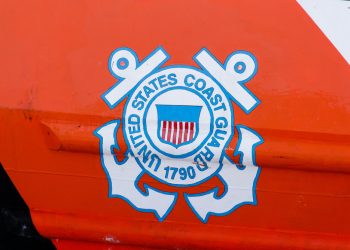The US Coast Guard has initiated a Class I Civil Penalty against the owner of the vessels ‘Alaska Patriot’ and ‘Alaska Pioneer’ after the first was left adrift and derelict approximately 172 miles south of Dutch Harbor, Alaska, in December 2017. Allegations include operating the two vessels beyond the boundary line without a valid load line, lack of a valid towing operator, and incorrect broadcast of Maritime Mobile Service Identity data, that could bring fines and penalties in excess of $155,000.
Lt. Michael Novak, a USCG investigator, explained:
The broadcasting of incorrect Automatic Identification System (AIS) information is dangerous for all vessels. The Alaska Pioneer incorrectly broadcasted that it was engaged in fishery and identified as an offshore supply vessel in Louisiana.
Specifically, the crew of the 172-ft Alaska Pioneer was towing the 170-ft fishing vessel Alaska Patriot to Mexico for scrap when its tow line broke on 3 December 2017. The crew managed to re-establish its tow but, when the tow line broke a second time, the vessel’s owner abandoned the Alaska Patriot.
The Coast Guard was notified by the crew of the Alaska Pioneer and maintained radio contact with the vessel as it continued to transit to Mexico. The crew of the Alaska Pioneer turned around to relocate the Alaska Patriot the next day but, after several days with no attempt by the vessel’s owner to re-establish control of the tow, a C-130 aircraft crew from Air Station Kodiak was launched to locate and survey the vessel while the crew of the USCG Cutter Sherman was granted permission to scuttle the Alaska Patriot as a hazard to navigation. Upon inspection and after confirming no persons or hazards remained aboard, the Coast Guard removed the Alaska Patriot’s EPIRB and sank the vessel.
Lt. Cmdr. Graham Lanz, Coast Guard District 17 staff attorney, said:
This case illustrates the importance of non-emergency towing operations being conducted only by licensed mariners with the proper endorsement. Commercial towing is a complicated and hazardous business, even in calmer waters than the Gulf of Alaska in winter. The Alaska Pioneer’s towing arrangement failed twice in heavy seas and unforgiving weather. Reconnecting a tow in those conditions poses significant risks, demonstrating why it is essential to get it right the first time.
As explained, AIS data is very important to mariners and is routinely relied upon to help avoid collisions at sea and receive safety related messages, while it also assists USCG in search and rescue operations. Lt. Novak added:
For these reasons, the integrity of AIS data transmitted by all vessels in US waters is absolutely crucial. The broadcast of incorrect AIS data is a navigational hazard which could result in avoidable accidents, especially in congested waters, or extend the response time of assets during search and rescue operations.
Towing in less than desirable weather and seas, coupled with unsatisfactory towing equipment, led to the eventual loss of this 170-foot vessel which posed a hazard to those around it. These are the types of things which a reasonable and prudent mariner who holds an appropriate credential would have been likely to avoid.






























































